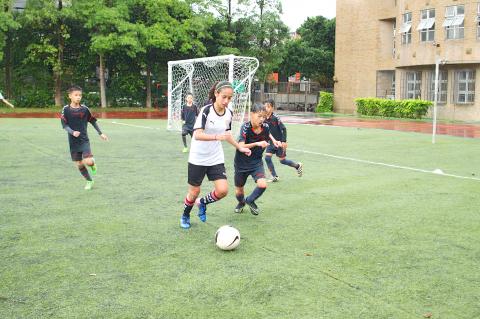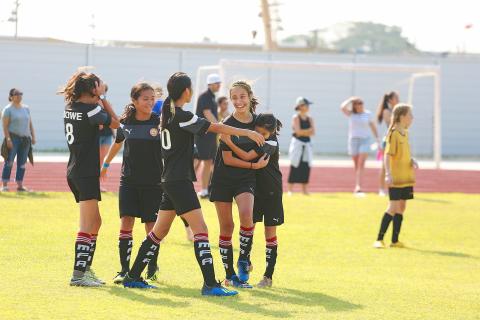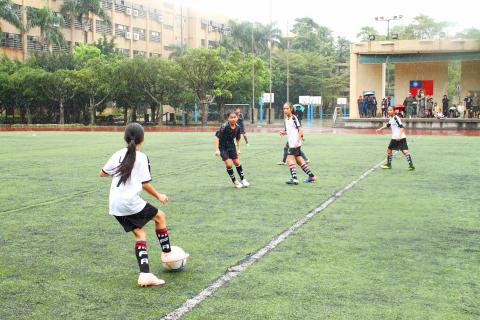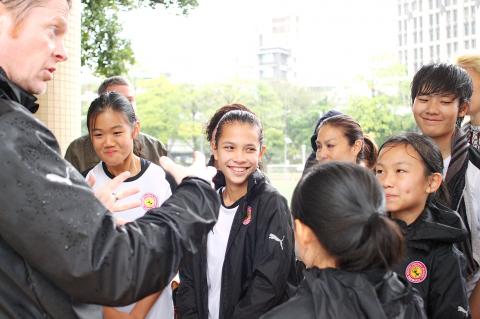Rain or shine, the girls of the Taipei Breakers soccer club turn up for their weekly training session at Shipai Junior High School (石牌國民中學) in Beitou District (北投). It’s a miserably cold and wet Sunday morning, and the pitch may be soaked, but rain does not dampen their enthusiasm.
Waiting restlessly for training to start, the girls titter and commiserate about schoolwork in excitable voices. Aged 11 to 13, on the cusp of awkward adolescence but honed by a sport that trains stamina and agility, they move with ease in baggy jerseys and long ponytails. One of the girls wears an enviable pair of pale pink soccer boots.
The Breakers are the only privately run, all-female youth soccer club in the city, with a roster of 12 girls drawn primarily from the Taipei American School (TAS). They are known for being a team that travels, and they travel well.

Photo: Davina Tham, Taipei Times
In April last year, in their first competition as a team after only three months of training together, they placed second in the under-12 girls’ cup at the Junior Soccer School and League tournament in Singapore. In January, they rose to become champions at the Bangkok International Girls Tournament.
CHILDHOOD AMBITIONS
When asked why they picked up soccer, the instinctive response from the girls is that “it’s fun.”

Photo courtesy of Elle Bowe
“And then you want to take it more serious,” adds Marlee Mann, 12.
The desire for structured training and opportunities to compete is what brings many of the girls to the Breakers, who compete in the local boys’ club Victory League, run by the Master Football Academy (MFA). There are no girls’ leagues and only ad-hoc girls’ tournaments in Taiwan, so the Breakers’ record of competing in overseas girls’ tournaments is a pull factor for serious players.
The Breakers are shaped by manager Elle Bowe and coach Daniel Calvert.

Photo: Davina Tham, Taipei Times
As team manager, Bowe aims for equal parts Scottish footballer Alex Ferguson and soccer mom — her daughter, Aleesa, plays for the Breakers. She recruits players, organizes the squad for competitions and networks with other clubs and leagues or tournament organizers to create competition opportunities for the girls.
But she also buys chocolate to keep the girls’ energy up after training and conducts hotel room briefings reminding the parents to behave during games at overseas tournaments. Last year, she organized a Mother’s Day gathering for the whole team and their parents. It was the first time most of the girls were seeing their teammates in dresses, she laughs, and they almost couldn’t recognize each other.
Arriving in Taipei five years ago, Bowe first jumped at the chance to manage The Heartbreakers, the parent-run girls’ soccer team of TAS. She sees her work, done without remuneration, as a way of ensuring that young female soccer enthusiasts have a platform to explore their passion for and advance in the sport.

Photo: Davina Tham, Taipei Times
“I didn’t have the chance, but my daughter, especially, and her friends have a chance to actually do what they love,” Bowe says.
Growing up in Singapore, Bowe and her two sisters accompanied her father to the local soccer league matches he watched every weekend. The early start gave her a lifelong love of the game. She played only casually, but the devotion was real — at age 16, she once skipped school to follow Manchester United around on their visit to her country (and got into trouble when her parents spotted her in the news coverage).
Breakers coach Calvert is the co-founder and head coach of MFA, which was established in Taipei in the summer of 2004. To prepare to run the academy, Calvert briefly returned to the UK to put himself through the rigorous Football Association coaching program and visit professional soccer academies.
Calvert is “strict,” Mann tells me, “but like, it’s good. Because we goof off a lot,” Rafi Liao, 12, chimes in. They finish each other’s sentences a lot too.
“He’s honest with us. Like if we’re not doing good then he tells us, and he tells us what we need to improve on, and then we work on that, and then we get better,” Mann says.
Dribbling, passes, shooting and setpieces may be the bread and butter of a training session, but Calvert tells me that attitude is one of the main components of being a good soccer player.
“One of the main challenges with kids is to get them to understand when to be serious and when to goof around,” Calvert says. It’s a recurring theme of his pep talks to the team during the training session and at half-time of the friendly match that I attend.
Calvert and Bowe also help the girls through other challenges: dealing with adversity, managing their emotions when they or their teammates make mistakes that cost them games and leaning how to lift each other out of disappointment. Instead of playing to win, Calvert says that one of the lessons he tries to impart is that “winning is a side effect of playing well in a team.”
This character-building explains some of the most unusual behavior I’ve seen on a soccer pitch. After the girls lose their friendly 3-2 to FC Vikings, a boys’ team, each team approaches the coach of the opposing team and bows, saying in unison: “Thank you, coach.”
THE FUTURE IS FEMALE
Nonetheless, the Breakers’ electrifying results at two overseas tournaments so far have made the girls hungry for more — more competitions, more exposure, more chances to prove just how good they are. The girls say it’s “fine” to play against boys, as they usually do in Taiwan, “because you get to push them around.”
“Not that we don’t do that to girls,”one interjects.
But there is no denying the particular thrill from playing against girls in the same age group.
“You can prove to them you’re better,” says Mann. (Following international youth soccer rules, the Breakers play with boys’ teams that are one age group younger so as to compensate for physical differences.)
Calvert tells me that the playing field for girls’ soccer in Taipei today is where boys’ soccer was a decade ago. While he has accompanied local boys to tryouts for professional clubs in China, and placed one with a soccer academy in the UK, he admits that girls here have not seen the same types of opportunities.
But girls, as always, will find a way. MFA trained 1,000 children in the Taipei area last year, and remain enthusiastic about the growth of girls’ soccer. Already, a few of the Breakers have been accepted into the youth team of the Chinese Taipei Football Association (CTFA). The key question is what they will do as they grow older and life intensifies — academic workloads and responsibilities, but also the interest of college and national soccer teams.
Kiki Li (李珮瑤), 12, has not yet tried out for the CTFA, but hopes to join the national team one day. The ruddy-cheeked and fearless striker cites penalty kicks as one of her favorite things to do on the pitch, and already has the gear to match — a CTFA towel that she received years ago when she was a ball girl for a national match.
But for now, there’s still some growing up to do. At the end of the friendly with FC Vikings, Bowe calls for a group photo and tries to get the teams to mix, gray and white jerseys interspersed. The girls make room, but the boys are shy and don’t budge. One makes a half-grimace and smacks his forehead to his hand. Now the girls are impatient to get out of the rain. The adults relent and the photo is taken with the teams standing apart.

June 9 to June 15 A photo of two men riding trendy high-wheel Penny-Farthing bicycles past a Qing Dynasty gate aptly captures the essence of Taipei in 1897 — a newly colonized city on the cusp of great change. The Japanese began making significant modifications to the cityscape in 1899, tearing down Qing-era structures, widening boulevards and installing Western-style infrastructure and buildings. The photographer, Minosuke Imamura, only spent a year in Taiwan as a cartographer for the governor-general’s office, but he left behind a treasure trove of 130 images showing life at the onset of Japanese rule, spanning July 1897 to

In an interview posted online by United Daily News (UDN) on May 26, current Chinese Nationalist Party (KMT) Chairman Eric Chu (朱立倫) was asked about Taichung Mayor Lu Shiow-yen (盧秀燕) replacing him as party chair. Though not yet officially running, by the customs of Taiwan politics, Lu has been signalling she is both running for party chair and to be the party’s 2028 presidential candidate. She told an international media outlet that she was considering a run. She also gave a speech in Keelung on national priorities and foreign affairs. For details, see the May 23 edition of this column,

The Taiwan People’s Party (TPP) on May 18 held a rally in Taichung to mark the anniversary of President William Lai’s (賴清德) inauguration on May 20. The title of the rally could be loosely translated to “May 18 recall fraudulent goods” (518退貨ㄌㄨㄚˋ!). Unlike in English, where the terms are the same, “recall” (退貨) in this context refers to product recalls due to damaged, defective or fraudulent merchandise, not the political recalls (罷免) currently dominating the headlines. I attended the rally to determine if the impression was correct that the TPP under party Chairman Huang Kuo-Chang (黃國昌) had little of a

At Computex 2025, Nvidia CEO Jensen Huang (黃仁勳) urged the government to subsidize AI. “All schools in Taiwan must integrate AI into their curricula,” he declared. A few months earlier, he said, “If I were a student today, I’d immediately start using tools like ChatGPT, Gemini Pro and Grok to learn, write and accelerate my thinking.” Huang sees the AI-bullet train leaving the station. And as one of its drivers, he’s worried about youth not getting on board — bad for their careers, and bad for his workforce. As a semiconductor supply-chain powerhouse and AI hub wannabe, Taiwan is seeing